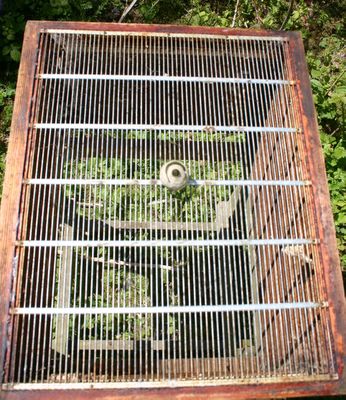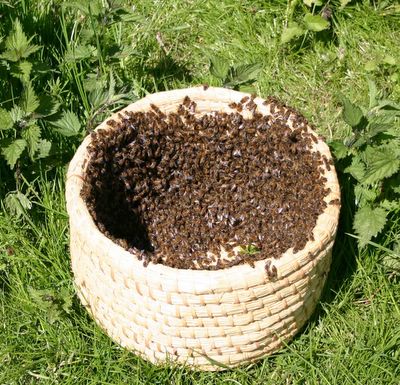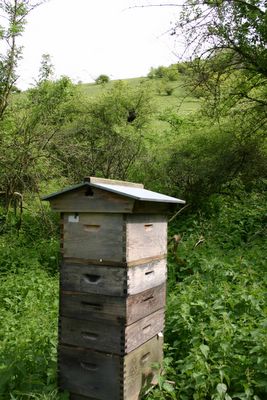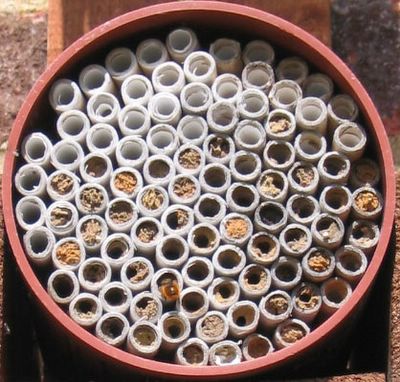I will arise now, and go to Innisfree ...
I'm off to visit the “bee-loud glade” (picture). Apologies to WB Yeats.
bees, honey and other sticky subjects
Over the next four years, researchers at Wake Forest will study the potential of propolis, a resinous substance collected by bees from the bark and leaves of trees and plants that has a history of use in folk medicine, and the food spice turmeric, to enhance the effects of radiation therapy.
The active component in propolis is caffeic acid phenethyl ester (CAPE), which studies have shown can protect mice against radiation induced inflammation and skin damage, and rats against certain forms of heart muscle damage following chemotherapy treatment.
... “A very interesting property of these compounds is that they have been shown to cause cell death in tumor cells but not in normal cells,” said lead investigator Dr Costas Koumenis, assistant professor of radiation oncology at Wake Forest BaptistMedical Centre.
He suggested the bees could be coming from countries which had volcanic activity, but he still could not understand why they were heading east towards Barbados.
“I wonder if they are sensing something from these islands and heading towards the east for refuge,” he told the Daily Nation.
Labels: varroa
Labels: varroa
“Once you start beekeeping as a hobby, you never run out of things to talk about at a cocktail party,” said Alvin Huie, 74, a Pacific Heights beekeeper.Ah yes, cocktail parties, remember them?
While researchers know that the Varroa mite is behind the death of bee colonies, the mechanism causing the deaths is still unknown. Yang and Dr. Diana L. Cox-Foster, Penn State professor of entomology, now believe that a combination of bee mites, deformed wing virus and bacteria is causing the problems occurring in hives across the country.
“Once one mite begins to feed on a developing bee, all the subsequent mites will use the same feeding location,” Cox-Foster said today. “Yang has seen as many as 11 adult mites feeding off of one bee. Other researchers have shown that both harmful and harmless bacteria may infect the feeding location.”
...Yang and Cox-Foster injected bacteria into bees. In mite-infested bees, the deformed wing virus blossomed rapidly. In mite-free bees, it didn't change.
A final, fatal step is involved. Worker bees put a sterilizing agent into honey and the colony's food. Mite-infested bees can't produce as much of the agent. Cox-Foster suspects the honey then carries more bacteria.
Labels: varroa
A beekeeper has removed some 3 million bees and 50 pounds of honey from the wall of a South Florida home after the owners reported buzzing in the wall.










Labels: swarming




“Any experienced beekeeper knows that if you put a transponder on a bee, it will cause a 'flight' response, and all the other bees around it will fly in the same direction,” he said. “This research has all sorts of problems with it because they're trying to prove something they think is true -- but scientists are suckers for the exotic, and this controversy will go on and on for decades.”In those immortal words: they haven't gone away, you know.
Uganda's honey entry to the European Union (EU) has been launched with a warning to all dealers in honey and other bee products against abusing quality standards since this would threaten the opportunity to export in the vast market.


For generations, beekeeping has been one of the most genteel of pastimes - a world of flower meadows, village fêtes and white-veiled enthusiasts pottering around, puffing smoke into hives.What a load of twaddle. As my late uncle used to say: beekeeping is all about sex, violence and daylight robbery.
The industry predicts that the acreage of bearing almond trees will grow by nearly 40% to more than 750,000 acres over the next five years. At that rate, California almond growers will require 1.5 million of the nation's 2.4 million commercial beehives to pollinate their orchards during the mid-February to early-March bloom each year, Brandi [Gene Brandi, a Los Banos beekeeper and former chairman of the National Honey Board] said.
For example, Terrence Sejnowski [a professor of biology at both the Salk Institute and UCSD] said that by using functional magnetic resonance imaging, which measures blood flow to reveal which regions of the brain are active, researchers in his laboratory have discovered that our brains process information about rewards differently if a reward is granted immediately for a simple behavior or if a person must work to receive the reward.
Canola is a genetic variation of rapeseed that was developed by Canadian plant breeders specifically for its nutritional qualities and its low level of saturated fat. ...For 4,000 years, the oil from the rapeseed was used in China and India for cooking and as lamp oil. During World War II, rapeseed oil was used as a marine and industrial lubricant. After the war, the market for rapeseed oil plummeted. Rapeseed growers needed other uses for their crop, and that stimulated the research that led to the development of canola. In 1974, Canadian plant breeders from the University of Manitoba produced canola by genetically altering rapeseed. ... Each canola seed contains approximately 40% oil. The rest of the seed is processed into canola meal, which is used as high protein livestock feed.
a not precise interpretation of the phrase “nectariphaires sources”, as to say sources of supplying of nectar, that was translated with the word “plants”.(I fear this translation from Italian news has gone a bit haywire too.)
“Bees. Twickenham has one of the best bee keeping centres in the country. Many local people support it. Benefits from bees' natural pollination activities are enormous, worth billions of pounds. There is however negligible research into damaging diseases and I have pressed the ministry of agriculture for a bigger research commitment.”Maybe a bit of context will help -- and in any case gives me a rare chance to opine about British party politics:
With all due respect to Labour, if that counts as an “uncosted Lib Dem spending commitment”, then I hear the sound of barrel bottoms being scraped.